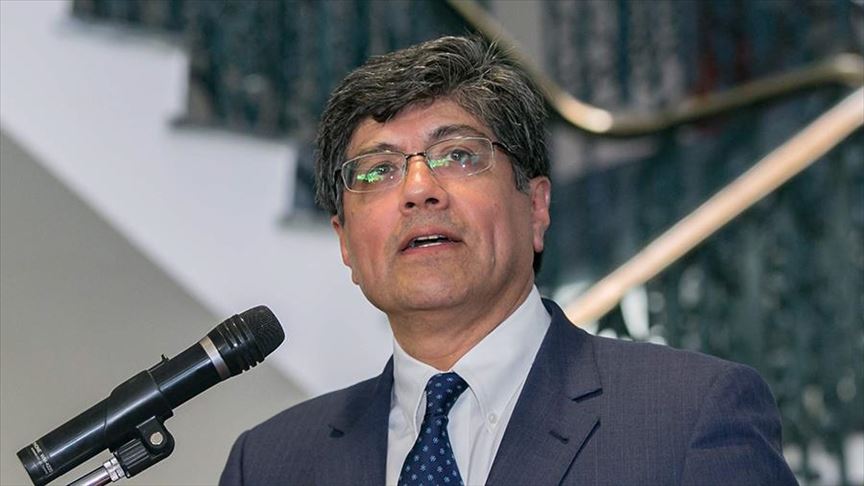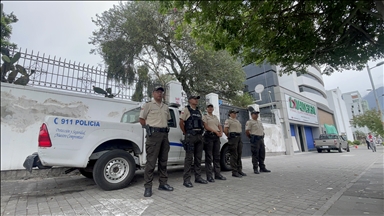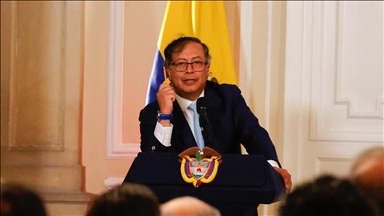
QUITO, Ecuador
Since Oct. 3, President Lenin Moreno's government is facing a series of protests against the economic measures it adopted within the framework of the credit agreement with the International Monetary Fund (IMF).
In the course of the week, protests have turned violent and the government has accused infiltrators of the previous government, led by Rafael Correa, of orchestrating them. Some have even said that there is evidence of interference from Venezuelan President Nicolas Maduro.
This Saturday, after 10 days of protests, and after riots around Congress, Moreno ordered curfew and militarized Quito, the country's capital and epicenter of the protests.
In the midst of the crisis the country is living, Jose Valencia, the minister of foreign relations and human mobility of Ecuador, spoke with Anadolu Agency about the measures that the government has implemented to deal with the protests.
Even though various groups of demonstrators have accused the government of repressing them and blame it for the four deaths that have been registered during the protests so far, Valencia says that “these four people didn´t die as a consequence of the confrontations with security forces”. According to him, “there isn´t a single person wounded with fire weapons fired by security forces or any other kind”.
Q: You, as part of the government, consider that this crisis Ecuador is living was provoked?
Jose Valencia: Yes, we have clear information that can also be seen easily through public statements and social media that shows that inside the indigenous organizations and unions, that are basically asking that the fuel subsidy is reinstated, there are those who have other purposes that are clearly political and that seek to destabilize the democratic order of the country.
Q: What are those proofs?
Valencia: There is some evidence and even public declarations that call, for example, to organize elections, that the president should quit and promote other actions that according to the constitution of the country are illegal and are not allowed.
We also have declarations that call people to protest, to occupy state installations, to block roads and perform violent actions.
Q: Are you talking about the public messages of former President Correa?
Valencia: He has made them and also some congressmen, we also have declarations made by other leaders of that party. But not only declarations, also we have seen, for example, infiltrators in the indigenous manifestations that have provoked looting in commercial establishments, occupation of state installations, destruction of public and private property, among other actions.
Q: What do you think is one of the most violent episodes that has happened during these protests?
Valencia: The high point of this violent and illegal action was the occupation of the oil facilities in the Ecuadorian Amazon that led to the suspension of the production of oil of the country and the suspension of the pipeline, and therefore the suspension of the exports of Ecuadorian oil.
A congressman from the party of former President Correa, and other sympathizers of that party, were the direct actors of that occupation that could have generated a terrible disaster with hundreds of people dead. They could have caused, for example, a fire in the oil installation. The congressman and those people have been detained and the prosecutor of the case has initiated a criminal prosecution.
Q: Is there evidence that these people received money from outside Ecuador for their protests or do they just sympathize with former President Correa´s ideology? It even has been said that they could be associated with President Nicolás Maduro…
Valencia: We have a series of indicators that lead us to that conclusion. The countries´ security agencies are working to establish those links, that protection that is offered. We are sure that the evidence they find will be handed to the justice system.
Q: What has been President Moreno's position on this subject?
Valencia: The president has been very clear on this subject. The interference of foreign powers will not be tolerated. Neither will the meddling of countries that seek to derail the legal order of Ecuador, provoke chaos or generate alarm to obtain political revenues.
Q: What has been your diplomatic management during this crisis?
Valencia: We have been in permanent contact with different countries of the area, and also from outside our region. Ecuador has received declarations from more than 20 countries, mostly from our region, but from other parts of the world as well, expressing their solidarity with the country in the face of the violence of these protests. They have also shown their solidarity with the course of action that the government has taken to maintain the democratic order of the country and, of course, called for a dialogue to resolve the differences.
The ones who suffer the most are people in general. When cities have a shortage of food because of the blockings on the roadways, or when medicines don´t arrive to the hospitals or when students can´t go to their schools. Those are the real victims.
Q: Will the government take back or revise the economic measures that sparked the protests?
Valencia: The Ecuadorian state stands firm with its decisions. As a democratic state, president Moreno is open to receiving any kind of suggestion to overcome the subject peacefully. The president has said on various occasions that he will continue until we achieve an appeasement of the country. We are optimistic about that.
Nevertheless, protests and road blockings persist…
A very big portion of the national territory is normalized. There are still focal points like the city of Quito and other provinces from the highlands, that haven´t been normalized but the Ecuadorian state is working for the normalization to be completed.
Q: Has any country offered their help to act as mediator of this crisis?
Valencia: No, there hasn’t been any specific offering from a particular country but we have good news. The UN in Ecuador and the Bishops Conference, from the Catholic church, are looking for ways promote a dialogue between the parties, and there have been preparatory meetings for a dialogue table.
Q: The Organization of American States issued a statement rejecting the acts of violence and promoting the protection of human rights. Is there an international report that indicates that there have been human rights violations at the hands of the Ecuadorian police?
Valencia: Absolutely none. Even when protests have been violent, the Ecuadorian Police has acted with great care, professionalism and discipline following the protocols that exist for these types of situations. We have to mourn the fact that four people have died, but I have to mention that these people have not died as a consequence of the confrontations with public force. In fact, there isn´t a single wounded person with fire weapons fired by public forces or any other kind.
Q: How is Ecuador’s image after these days of protests?
Valencia: I would say that even though there are news about the protests, other countries understand what is the reality of the country. So much so that there have been 20 declarations and a call to peace, in which they understand President Moreno´s actions as the ones of a democratic leader. They also call to maintain the rule of law and prevent a coup that violent people want to promote. They also call for the discussions to start.
Q: The government considers that the situation is being normalized?
Valencia: There are wonderful indicators that a normalization is taking place. For example, on Oct. 9 in Guayaquil, the biggest and most populated city of the country, there was a manifestation supporting the government’s position of pursuing social peace and maintaining the democratic order. At least 300,000 people took to the streets. That helps to show that the government´s decisions, even when they are difficult, are understood by a large portion of the population and those who protest against the government are a minority, that we respect. Even with that minority we want to achieve an agreement through dialogue and not trough violent actions.
Q: Some days ago several Venezuelan citizens were arrested during violent acts and the vice president announced that the government could even decide to deport foreigners who break the law. Does the current Human Mobility Law allow deportation of foreign citizens or what would this process be like?
Valencia: The legal proceedings on those cases have begun. Ecuador has a rule of law, we do not act in a rash manner, but adhere to legal norms. The people who are being investigated, the ones who were captured in recent days, some of them Venezuelans who were found with information on the routes of the caravans of the president and vice president, were placed at the disposal of the judges. The judges will be the ones who make the decisions in this regard; if it comes to a deportation, it will be the judges who determine it.
Anadolu Agency website contains only a portion of the news stories offered to subscribers in the AA News Broadcasting System (HAS), and in summarized form. Please contact us for subscription options.



